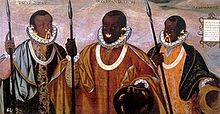Zambos

16th-century painting of Zambo Caciques from Esmeraldas, Ecuador
|
|
| Total population | |
|---|---|
| (801,000) | |
| Regions with significant populations | |
| Latin America and the Caribbean | |
| Languages | |
| Spanish, Portuguese and English | |
| Religion | |
| Christianity (predominantly Roman Catholic, minority practices Protestantism), tribal religions | |
| Related ethnic groups | |
| Garifuna, Africans, Afro-Caribbeans, and Amerindians |
Zambo (Spanish: [ˈθambo] or [ˈsambo]) and cafuzo (Portuguese: [kɐˈfuzu]) are racial terms used in the Spanish and Portuguese Empires and occasionally today to identify individuals in the Americas who are of mixed African and Amerindian ancestry (the analogous English term, considered a slur, is sambo). Historically, the racial cross between African slaves and Amerindians was referred to as a zambaggoa, then zambo, then sambo. In the United States, the word sambo is thought to refer to the racial cross between a black slave and a white person.
The meaning of the term sambo however is contested in North America, where other etymologies have been proposed. The word most likely originated from one of the Romance languages, or Latin and its direct descendants. The feminine word is zamba (not to be confused with the Argentine Zamba folk dance, although there is some relationship in the concept).
Under the casta system of Spanish colonial America, the term originally applied to the children of one African and one Amerindian parent, or the children of two zambo parents. During this period, many other terms denoted individuals of African-Amerindian ancestry in ratios smaller or greater than the 50:50 of zambos: cambujo (zambo-Amerindian mixture) for example. Today, zambo refers to all people with significant amounts of both African and Amerindian ancestry, though it is frequently considered pejorative.
...
Wikipedia
